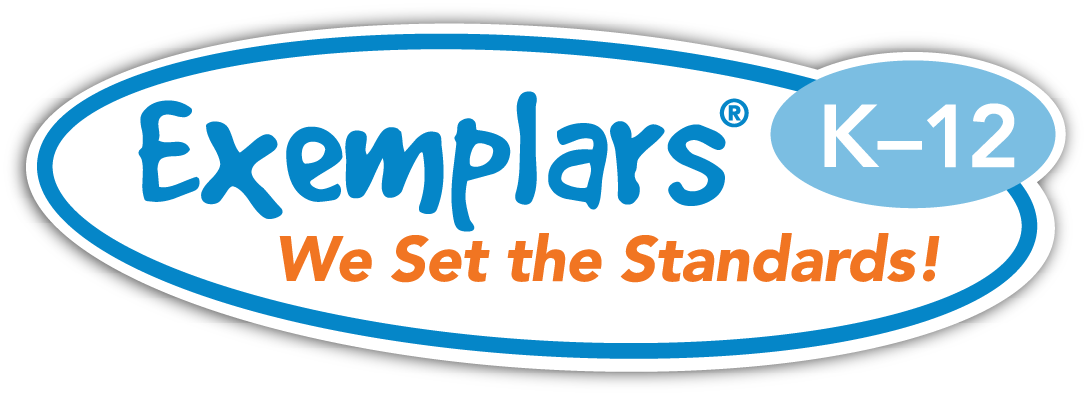Research Foundations
Exemplars publishes hands-on, standards-based assessment and instruction material that focuses on authentic learning in the areas of Math, Science and Writing. Exemplars material is based on sound scientific research that underscores the following about student achievement:
- Students who do demanding work in school perform better than students who are given less demanding work.
- Student achievement is strongly related to effective assessment practices in the classroom, including student self- and peer-assessment.
- The style of classroom instruction influences student performance.
Demanding Work Drives Performance
1. Students who do demanding work in school perform better than students who are given less demanding work.
Perhaps the most important study in this area was designed to answer the following question: "What happens to students' scores in standardized tests of basic skills when urban teachers in disadvantaged schools assign work that demands complex thinking and elaborated communication about issues important to student lives?" Bryk, Anthony S., Jenny K. Nagoaka, and Fred M. Newmann.Authentic Intellectual Work and Standardized Tests: Conflict of Coexistence?. Consortium on Chicago School Research, January 2001.
Research done by the Chicago School Research Project, supported by the Annenberg Foundation, reports the results of a three-year study of more than 400 classrooms from 19 different Chicago elementary schools. The intellectual demands of more than 2,000 classroom assignments given to 5,000 third, sixth, and eighth-grade students in writing and math were analyzed for their level of difficulty and linked to the learning gains on standardized tests in reading, writing, and mathematics.
Three standards were used to determine the level of intellectual challenge for each assignment. They were the extent that the assignment: (1) requires the construction of knowledge through disciplined inquiry including the use of prior knowledge and in-depth understanding; (2) requires elaborated communication; and (3) has value beyond success at school.
After controlling for, "...differences in racial composition, gender, and socioeconomic status." the authors conclude:
... the evidence indicates that assignments calling for more authentic intellectual work actually improve student scores on conventional tests. The results suggest that if teachers, administrators, policy makers and the public at large place more emphasis on authentic intellectual work in classrooms, yearly gains on standardized tests in Chicago could surpass national norms. Bryk, Anthony S., Jenny K. Nagoaka, and Fred M. Newmann. Authentic Intellectual Work and Standardized Tests: Conflict of Coexistence?. Consortium on Chicago School Research, January 2001.
On the other hand, in classrooms where assignments were less demanding, students gained 22 percent less in mathematics than the national average. Furthermore, "it is the intellectual demands embedded in classroom tasks, not the mere occurrence of a particular teaching strategy or technique, that influence the degree of student engagement and learning." Bryk, Anthony S., Jenny K. Nagoaka, and Fred M. Newmann. Authentic Intellectual Work and Standardized Tests: Conflict of Coexistence?. Consortium on Chicago School Research, January 2001.
Effective Assessment Practices Lead to Achievement
2. Student achievement is strongly related to effective assessment practices in the classroom, including student self- and peer-assessment.
A study conducted by Paul Black and Dylan Wiliam on the effect of classroom assessment practices on student achievement examined 250 articles and chapters on the subject. The study concluded that effective classroom assessment has a major impact on student achievement.
For public policy towards schools, the case to be made here is firstly that significant learning gains lie within our grasp. The research reported here shows conclusively that formative assessment does improve learning. The gains in achievement appear to be quite considerable, and as noted earlier, amongst the largest ever reported for educational interventions. As an illustration of just how big these gains are, an effect size of 0.7, if it could be achieved on a nationwide scale, would be equivalent to raising the mathematics attainment score of an 'average' country like, England, New Zealand or the United States into the 'top five' after the Pacific rim countries of Singapore, Korea, Japan and Hong Kong. Black, Paul and Dylan Wiliam, Assessment and Classroom Learning. Assessment in Education, March, 1988.
A second study by Black and Wiliam summarizes the finding of over 40 articles that share the following characteristics; quantitative evidence of increased learning was collected for both an experimental group and a control group. All of these studies demonstrate innovations that include strengthening the practice of formative assessment produce significant and often substantial learning gains. Black, Paul and Dylan Wiliam, Inside the Black Box: Raising Standards Through Classroom Assessment. Phi Delta Kappan, October 1998.
Instruction Style Matters
3. The style of classroom instruction influences student performance.
In 2001 the RAND Corporation published, "Hands-on Science and Student Achievement", a study written by Allen Ruby that examines the relationship between hands-on science and student achievement on both standardized and performance-based tests.
The study used two sources of data, a RAND survey of 1,400 eighth graders and their teachers and the National Educational Longitudinal Survey of 1988 (NELS:88) a national survey of approximately 25,000 students in eighth, 10th and 12th grades and their teachers. Students in the RAND survey took both standardized and performance tests. NELS:888 students took only multiple-choice science tests. In both studies, teachers, and students reported on the amount of hands-on science they engaged in during science classes.
In both studies, the data show hands-on science is positively related to test scores on both types of tests. The RAND survey showed a strong relationship between doing hands-on science and achievement on both performance tests and multiple-choice tests. NELS:88 results indicate that students in classrooms with hands-on science showed higher levels of achievement. The evidence for the relationship between hands-on science and multiple-choice tests is particularly strong because it is supported by two different surveys using different multiple-choice tests.

